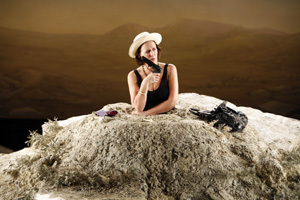
Paulanne Simmons
"Happy Days"
 |
| Fiona Shaw as Winnie in "Happy Days" by Samuel Beckett, directed by Deborah Warner, National Theatre of Great Britain, photo by Richard Termine. |
"Happy Days"
Directed by Deborah Warner
BAM Harvey Theater
651 Fulton St. between Ashland and Rockwell places
Opened Jan. 8, 2008
Jan. 8, 9, 10-12, 15-19, 22-26, 29-31, Feb. 1 and 2 at 7:30 p.m.
Jan. 12, 19, 26 and Feb. 2 at 2 p.m.
Jan 13, 20 and 27 at 3 p.m.
$25, $45, $65, $75
Closes Feb. 2, 2008
Reviewed by Paulanne Simmons Jan. 9, 2008
There are two characters in Samuel Beckett's "Happy Days." One
is Winnie, a fifty-year-old woman who cannot walk because she is partially
buried, or literally in a hole. The other is her husband, Willie, a sixty-year-old
man who cannot talk. Or rather a man who can only occasionally talk in
monosyllables and grunts. Winnie, on the other hand, can certainly talk.
And that she does, incessantly, compulsively, endlessly, in a two-act
monologue only punctuated by her equally obsessive busywork. Winnie brushes
her teeth, puts on makeup, examines the labels on bottles and holds up
an umbrella even though it is not raining. She takes several objects out
of her voluminous black handbag, most significantly an ominous black pistol,
which she finds somewhat comforting.
In National Theatre of Great Britain's production, directed by Deborah Warner, now at BAM's Harvey Theater, the incomparable Fiona Shaw is Winnie. This is not the first time Shaw and Warner have teamed up. They have worked together in eleven collaborations, most notably the riveting "Medea," which was part of BAM's 2002 Next Wave Festival. Much as she did with the out-of-control Medea, Shaw makes Winnie as ordinary, likable and believable as a suburban housewife. And she does this without losing any of the tragedy (or comedy) essential to the character and Beckett's play. Sometimes she is exasperated with her lethargic, mostly silent husband. Often she is quite funny in a flustered, irrational Gracie Allen kind of way.
This production is essentially faithful to the playwright's intentions. In fact, it couldn't be otherwise. Edward Beckett, the playwright's nephew, insists on nothing less. He had already withdrawn the rights to Warner's previously planned production of Beckett's "Foot Falls" because of what he perceived as unacceptable deviations.
Tom Pye's set of a rocky, barren landscape backed by a screen bearing a panoramic view of that landscape continuing endlessly is only marginally different from Beckett's "scorched grass rising centre to low mound." And the melody of the theme song from the sitcom "Happy Days," played during the intermission, is a whimsical addition that Edward Beckett apparently did not find objectionable. It is worth mentioning (and most probably most often will not happen) that Tim Potter plays his thankless role with great gusto. His lumbering movements, his animal-like grunts and groans are the perfect counterpart to Winnie's eloquent refusal to admit defeat. His contribution is priceless.
Many people regard Beckett's plays as abstract, obscure and intellectual. This production brilliantly exposes the emotional core of Beckett's tragicomic view of life.
From Winnie's cheerful "Another heavenly day,"
to the ambiguous ending, from her "poor, dear Willie" to her
pathetic plea "Was I ever lovable?" to her ironic "There
was a time when I could have given you a hand," Shaw, under Warner's
visionary direction, mines all the sorrow and sweetness that make life
unbearable, and bearable.

| lobby | search
| home | cue-to-cue |
discounts | welcome | film
| dance | reviews |
| museums | NYTW
mail | recordings | coupons |
publications | classified |